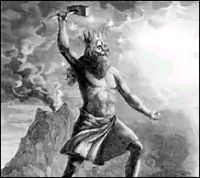| The Column: Hello and Welcome! Let's talk about myths, legends, and folklore in this month's column.
In the beginning days of speakers this memorization was nearly computer accurate, with little to no changes or corruption of facts being made from generation to generation. However as time went on, facts and figures began to get fuzzy as some information was lost or invented by the speakers to fill in gaps that would occur when a master would unexpectedly die before he had a chance to fully train the student. As such, the information passed down, slowly, became less accurate and more fable like with individual interpretation and each succeeding generation. Luckily for the Old Testament writing was invented before many of the facts could be corrupted and then a very precise form of making hand copies of the facts came about (more on that another time). The point here is that all myths, legends, and folklore can often be traced back to a time when history was passed on from one person to another in verbal form. Today, what distinguishes a myth, legend, or folklore from factual history is the amount of error that possibly has been introduced into the material. Since there is no way to know for sure what is inaccurate and what is fact, we have to make assumptions based on what we know today of life back then and based on how we perceive our current world to be. This does not negate the knowledge that is transmitted in myths, legends, or folklore as pure rubbish or fabrication. Rather a myth, legend, or folklore could perhaps point to abilities or occurrences in people and things that were quite common in that time and day, but today we do not see these kinds of things, so we have to discount that myth, legend or folklore as inaccurate or even contrived. The earth is very very old and life now is surely much different than it was 100, 1000 or even 10,000 years ago. So, when you hear of a myth, legend, or folklore realize that what is contained in that body of knowledge may be inaccurate in some places and very accurate in others. Which is which has been the debate for many years in the past, and I'm sure for will be debated for many years in the future... Till next month! Links:
|
Column TimeLine
 folk�lore (f�k�l�r�, -l�r�) n. 1. The traditional beliefs, myths, tales, and practices of a people, transmitted orally. 2. The comparative study of folk knowledge and culture. Also called folkloristics. 3.a. A body of widely accepted but usually specious notions about a place, a group, or an institution. b. A popular but unfounded belief. leg�end (l�j��nd) n. 1.a. An unverified story handed down from earlier times, especially one popularly believed to be historical. b. A body or collection of such stories. c. A romanticized or popularized myth of modern times. 2. One that inspires legends or achieves legendary fame. 3.a. An inscription or a title on an object, such as a coin. b. An explanatory caption accompanying an illustration. c. An explanatory table or list of the symbols appearing on a map or chart. myth (m�th) n. 1.a. A traditional, typically ancient story dealing with supernatural beings, ancestors, or heroes that serves as a fundamental type in the world view of a people, as by explaining aspects of the natural world or delineating the psychology, customs, or ideals of society. b. Such stories considered as a group. 2. A story, a theme, an object, or a character regarded as embodying an aspect of a culture. 3. A fiction or half-truth, especially one that forms part of an ideology. 4. A fictitious story, person, or thing. |
This article is from the current Reality Creator Series Books, or upcoming books, or website content. © copyright 1995 - 2024 by Tom DeLiso